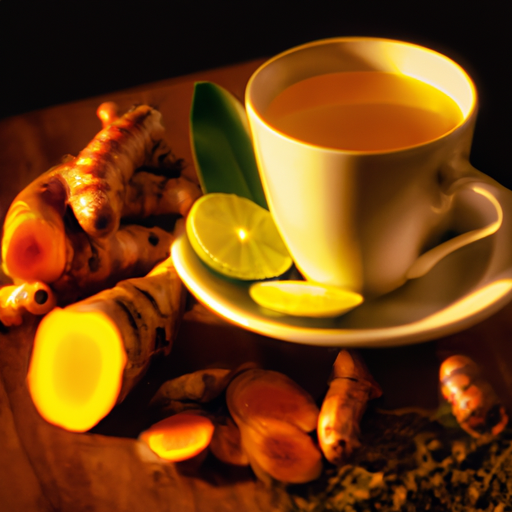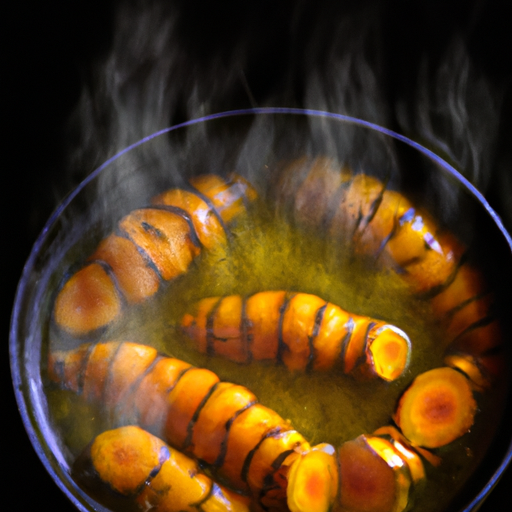As a man in my middle age, I am becoming more conscious of the possible health issues related to an enlarged prostate. Benign Prostatic Hyperplasia (BPH) is a typical condition that impacts numerous men as they get older, leading to problems with urination and discomfort. While prescribed drugs can provide some relief, a lot of men are now looking into natural solutions like turmeric tea to help relieve their symptoms.
In this article, I will explore the research behind turmeric and BPH, as well as provide a recipe for making turmeric tea and discuss other natural remedies and lifestyle changes that can help improve BPH symptoms.
There is growing interest in the potential benefits of turmeric for prostate health, and some preliminary research suggests that it may be effective in reducing the size of the prostate. As a natural anti-inflammatory and antioxidant, turmeric may also help reduce inflammation in the prostate gland, which is a key factor in the development of BPH.
However, it is important to understand the limitations of this research and to speak with a healthcare professional before incorporating turmeric into your routine. In this article, I will provide a balanced and evidence-based overview of the potential benefits and risks of using turmeric tea for BPH.
Key Takeaways
- Turmeric may be effective in reducing the size of the prostate and reducing inflammation in the prostate gland, which is a key factor in the development of BPH.
- Taking a combination of turmeric and saw palmetto supplements over a period of six months resulted in significant improvements in urinary flow rate and reduction in prostate volume.
- Consuming 500-2000 mg of curcumin (the active ingredient in turmeric) per day may have potential benefits for prostate health, but excessive consumption may have adverse effects on the body such as gastrointestinal issues and liver toxicity.
- It’s important to speak with a healthcare provider before incorporating turmeric tea or supplements into a daily routine, especially if taking any medications or having a pre-existing medical condition.
Understanding Benign Prostatic Hyperplasia (BPH)
Got an enlarged prostate? Let’s talk about BPH and how it affects your body.
Benign Prostatic Hyperplasia (BPH) is a non-cancerous growth of the prostate gland that occurs in men as they age. As the prostate gland enlarges, it can cause urinary symptoms such as frequent urination, difficulty starting and stopping urine flow, weak urine stream, and the feeling of incomplete bladder emptying.
The exact cause of BPH is unknown, but it’s believed to be related to changes in hormone levels as men age. There are several treatment options available for BPH, including medications, minimally invasive procedures, and surgery.
Prevention measures include maintaining a healthy lifestyle, such as exercising regularly, maintaining a healthy weight, and avoiding alcohol and caffeine.
With that said, let’s dive into the research on turmeric and BPH.
Research on Turmeric and BPH
In this section, I’ll be discussing the research on turmeric and its potential effects on benign prostatic hyperplasia (BPH).
There have been several studies conducted on turmeric’s ability to alleviate BPH symptoms, such as urinary retention and inflammation.
Additionally, researchers have looked into the potential mechanisms of action for turmeric in BPH, including its anti-inflammatory and antioxidant properties.
Studies on Turmeric’s Effects on BPH Symptoms
You’ll be happy to know that studies have shown turmeric’s potential to alleviate symptoms of an enlarged prostate, like difficulty urinating and frequent urination. Here are four key findings from recent research on turmeric supplements and alternative treatments for BPH:
-
One study found that taking a combination of turmeric and saw palmetto supplements over a period of six months resulted in significant improvements in urinary flow rate and reduction in prostate volume.
-
Another study found that curcumin, the active ingredient in turmeric, inhibited the growth of prostate cancer cells in vitro and may have potential as a natural anti-cancer agent.
-
A review of clinical trials on turmeric and BPH found that turmeric supplementation may have a beneficial effect on urinary symptoms, but more research is needed to confirm these findings.
-
Some experts suggest that turmeric’s anti-inflammatory and antioxidant properties may play a role in reducing inflammation and oxidative stress in the prostate, which are thought to contribute to BPH.
These findings suggest that turmeric may be a promising alternative treatment for BPH, but more studies are needed to determine its effectiveness and potential mechanisms of action.
Potential Mechanisms of Action for Turmeric in BPH
Recent studies have shed light on the potential mechanisms of action for this natural remedy in addressing symptoms related to BPH. Turmeric’s anti-inflammatory properties have been shown to reduce inflammation in the prostate gland, which is a key factor in the development of BPH. Inflammation can lead to oxidative stress, which damages cells and impairs their function. Turmeric’s anti-inflammatory properties can help reduce oxidative stress and improve the overall health of the prostate gland.
Moreover, turmeric may also have a potential impact on hormone levels in BPH. The active ingredient in turmeric, curcumin, has been shown to inhibit the activity of certain enzymes that convert testosterone into dihydrotestosterone (DHT), a hormone that is implicated in the development of BPH. By reducing the levels of DHT in the prostate gland, turmeric may help alleviate some of the symptoms associated with BPH.
These mechanisms of action make turmeric a promising natural remedy for managing BPH symptoms. In the following section, I’ll discuss a turmeric tea recipe that can be used to reap the benefits of this natural remedy.
Turmeric Tea Recipe
As I delve into the topic of turmeric tea, I find it crucial to discuss the ingredients and preparation of this beverage.
To make a cup of turmeric tea, one needs to use turmeric powder, water, and other optional ingredients such as ginger, honey, or lemon. However, it’s essential to ensure the quality of the ingredients to reap the benefits of turmeric tea fully.
Additionally, it’s important to consider the dosage and safety considerations of consuming turmeric tea. Excessive consumption may lead to adverse effects, especially for individuals with certain medical conditions or on certain medications.
Ingredients and Preparation
To make turmeric tea for an enlarged prostate, simply boil water and add turmeric powder, ginger, and honey for a delicious and healthy drink. Turmeric tea benefits the body in many ways, including reducing inflammation, improving digestion, and enhancing brain function. Ginger is also known for its anti-inflammatory properties and can help relieve pain and nausea. Honey adds a touch of sweetness while providing antioxidants and antibacterial properties.
To prepare the tea, follow these simple steps:
- Boil 2 cups of water in a pot.
- Add 1 teaspoon of turmeric powder and 1 teaspoon of grated ginger.
- Let the mixture simmer for 10-15 minutes.
- Strain the tea and add honey to taste.
It’s important to note that while turmeric tea is generally considered safe, it may interact with certain medications and should be consumed in moderation. In the next section, we’ll discuss dosage and safety considerations for those who wish to incorporate turmeric tea into their daily routine.
Dosage and Safety Considerations
Before you start incorporating turmeric tea into your daily routine for enlarged prostate, it’s important to consider the appropriate dosage guidelines and safety precautions. According to research, consuming 500-2000 mg of curcumin (the active ingredient in turmeric) per day may have potential benefits for prostate health. However, it’s important to note that excessive consumption of curcumin may have adverse effects on the body such as gastrointestinal issues and liver toxicity.
To ensure safety and effectiveness, it’s best to consult with a healthcare professional before adding turmeric tea to your diet. Additionally, it’s important to purchase high-quality turmeric and prepare it properly to ensure maximum absorption of curcumin. By following proper dosage guidelines and safety precautions, turmeric tea may be a beneficial addition to your natural approach to managing enlarged prostate.
Moving forward, let’s explore other natural remedies for BPH that may complement the use of turmeric tea.
Other Natural Remedies for BPH
If you’re looking for alternative ways to manage an enlarged prostate, there are plenty of natural remedies worth exploring. Natural supplements like saw palmetto, pygeum, and stinging nettle root have shown promise in reducing the symptoms of BPH. Saw palmetto, in particular, has been extensively studied and has been found to improve urinary flow and reduce nighttime urination.
Pygeum, on the other hand, has been shown to reduce inflammation in the prostate gland, while stinging nettle root has been found to inhibit the growth of prostate cells. Aside from natural supplements, lifestyle modifications can also be helpful in managing BPH symptoms.
Regular exercise, for instance, can improve urinary flow and reduce inflammation in the body. Maintaining a healthy diet that’s low in fat and high in fiber can also help improve prostate health. Other lifestyle changes that can help alleviate BPH symptoms include avoiding caffeine and alcohol, limiting fluid intake before bedtime, and practicing stress management techniques.
By incorporating these natural remedies and lifestyle modifications into your routine, you may be able to manage your BPH symptoms more effectively.
Lifestyle Changes to Improve BPH Symptoms
Incorporating some simple changes into your daily routine can help you manage the symptoms of BPH more effectively. Here are some lifestyle modifications that can help alleviate the symptoms of an enlarged prostate:
-
Exercise routines: Regular exercise can help improve your overall health and may also reduce BPH symptoms. Kegel exercises, which strengthen the pelvic floor muscles, can also help improve urinary flow.
-
Dietary changes: A healthy diet that’s rich in fruits, vegetables, and whole grains can provide the necessary nutrients for good prostate health. You may also want to limit your caffeine and alcohol intake, as both can irritate the bladder and aggravate BPH symptoms.
-
Urinate regularly: Don’t hold your urine for too long, and make sure to empty your bladder completely each time you urinate.
-
Avoid decongestants and antihistamines: These medications can worsen BPH symptoms by tightening the bladder neck and prostate muscles.
-
Manage stress: Stress can worsen BPH symptoms, so finding ways to manage stress, such as practicing relaxation techniques, can be helpful.
It’s important to note that while lifestyle changes can be beneficial for managing BPH symptoms, they may not be enough to completely alleviate the condition. In the next section, we’ll discuss potential risks and side effects of turmeric as a natural remedy for enlarged prostate.
Potential Risks and Side Effects of Turmeric
As I delve into the potential risks and side effects of turmeric, I find that it’s important to consider how it may interact with medications.
Turmeric can interact with drugs such as blood thinners, anti-inflammatory medications, and chemotherapy drugs.
Additionally, it’s crucial to be aware of the potential for allergic reactions to turmeric, as some people may experience hives, difficulty breathing, or other symptoms.
Interactions with Medications
Turmeric tea may interact with certain medications, such as blood thinners like warfarin, increasing the risk of bleeding and bruising. In fact, a study found that taking turmeric supplements alongside warfarin increased the risk of bleeding in patients. Additionally, turmeric may interact with drugs that affect the liver, such as cholesterol-lowering medications and some antidepressants. This interaction may increase the risk of liver damage or interference with the effectiveness of the medication.
To better understand the potential interactions between turmeric and medications, here is a table summarizing some of the known interactions:
| Medication | Potential Interaction |
|---|---|
| Blood thinners (e.g. Warfarin) | Increased risk of bleeding and bruising |
| Cholesterol-lowering medications | Increased risk of liver damage |
| Antidepressants | Interference with medication effectiveness |
It is important to speak with your healthcare provider before incorporating turmeric tea or supplements into your daily routine, especially if you are taking any medications or have a pre-existing medical condition. In the next section, we will explore the potential for allergic reactions to turmeric.
Allergic Reactions
It’s crucial to be aware of potential allergic reactions to turmeric, as it can cause a range of symptoms in certain individuals.
Some common symptoms of an allergic reaction include:
- Skin rash
- Hives
- Itching
- Swelling of the face, lips, tongue, or throat
If you experience any of these symptoms after consuming turmeric tea, stop its use immediately and seek medical attention.
If you have a history of allergies, it’s important to speak with your doctor before incorporating turmeric into your diet.
If you do experience an allergic reaction, there are turmeric tea alternatives that you can consider.
Ginger tea or green tea can be a great substitute as they have similar anti-inflammatory properties without the risk of an allergic reaction.
It’s important to always read labels and speak with your doctor before trying any new supplements or dietary changes.
Talking to Your Doctor About Turmeric and BPH
When you meet with your doctor, imagine being able to ask them about natural remedies, like turmeric, for managing BPH symptoms. It’s important to have an open and honest dialogue with your healthcare provider about any complementary or alternative medicine you may be considering. Your doctor can help you weigh the benefits versus the risks, and separate evidence-based information from anecdotal claims.
When it comes to turmeric and BPH, there is some evidence to suggest that its active ingredient, curcumin, may have anti-inflammatory properties that could help alleviate prostate inflammation and reduce the symptoms of BPH. However, more research is needed to fully understand its effects and potential interactions with other medications.
Your doctor can help you navigate the available information and determine if turmeric is a safe and effective option for managing your BPH symptoms.
Frequently Asked Questions
What are the long-term effects of drinking turmeric tea for enlarged prostate?
Long-term risks and safety concerns of drinking turmeric tea for enlarged prostate are not well-established. While turmeric has anti-inflammatory properties, more research is needed to determine its effects on prostate health.
Can turmeric tea cure enlarged prostate or just alleviate symptoms?
Enlarged prostate treatment options include medication and surgery. While turmeric tea benefits prostate health, it is not a cure for the condition. However, it may alleviate symptoms due to its anti-inflammatory properties.
How much turmeric tea should I drink daily to see an improvement in my enlarged prostate symptoms?
To see an improvement in symptoms of an enlarged prostate, I recommend a daily turmeric tea dosage of 1-1.5 teaspoons of turmeric powder per cup of hot water. Studies suggest that the health benefits of turmeric may alleviate symptoms, but further research is needed.
Are there any food or drug interactions with turmeric tea that I should be aware of?
Before trying turmeric tea, it is important to consider potential risks, benefits, and drawbacks. Dosage and preparation tips should also be followed. An interesting statistic: turmeric may interact with blood thinners.
Can turmeric tea be used as a standalone treatment for enlarged prostate or should it be combined with other remedies?
As a standalone treatment, turmeric tea may not be sufficient to effectively manage an enlarged prostate. Combining it with other remedies, such as medication prescribed by a healthcare professional, may be more effective. Evidence-based research supports the use of turmeric for its anti-inflammatory properties, which may help alleviate symptoms of an enlarged prostate, but additional treatment may still be necessary.
Conclusion
In conclusion, as someone who’s struggled with BPH symptoms, I can say that incorporating turmeric tea into my daily routine has been beneficial. The anti-inflammatory properties of curcumin, the active ingredient in turmeric, may help reduce prostate inflammation and improve urinary symptoms. However, it’s important to note that turmeric shouldn’t be used as a substitute for medical treatment prescribed by a healthcare professional.
Along with turmeric tea, there are other natural remedies and lifestyle changes that can improve BPH symptoms. These include saw palmetto, exercise, and reducing caffeine and alcohol intake. It’s important to talk to your doctor before starting any new supplement or treatment, including turmeric.
As the saying goes, "an ounce of prevention is worth a pound of cure."Taking steps to manage BPH symptoms early on can prevent further complications down the road.










